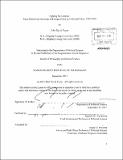Fighting for control : state-sponsored terrorism as foreign policy in Cuba and Libya, 1959-2010
Author(s)
Payne, John David, Ph. D. Massachusetts Institute of Technology
DownloadFull printable version (13.18Mb)
Alternative title
Sate-sponsored terrorism as foreign policy in Cuba and Libya, 1959-2010
Other Contributors
Massachusetts Institute of Technology. Dept. of Political Science.
Advisor
Stephen W. Van Evera.
Terms of use
Metadata
Show full item recordAbstract
In this dissertation, I ask four inter-related questions about state-sponsored terrorism. First, under what conditions do states choose to support foreign terrorist groups? Second, when do sponsor states stop supporting terrorism? Third, how can states which are the targets of terrorism best persuade sponsor states to cease their support? Fourth, how can sponsor states best avoid being held accountable for the actions of their terrorist agents? Building on Byman and Kreps' theoretical model of state-sponsored terrorism as a principal-agent relationship, I propose four hypotheses to answer these questions. First, states sponsor terrorism because they meet three necessary conditions: motivations for conflict, constraints against open conflict, and a perceived lack of accountability. Second, states cease supporting terrorism when any of these conditions changes. Third, states that are the targets of state-sponsored terrorism can best persuade state sponsors to change their behavior by holding them accountable for the actions of their terrorist agents. Fourth, states that sponsor terrorism will be more likely to avoid accountability if they sacrifice both control over their terrorist agents and credit for their agents' successes. These hypothesized answers are tested by examining two in-depth case studies of state-sponsored terrorism, Libya and Cuba during the Cold War. The evidence from these cases is generally congruent with the four hypotheses, with the first and second hypotheses demonstrating the best fit. The cases also yield five prescriptions for policy makers. First, economic sanctions may be more effective than military action at holding sponsor states accountable for the actions of their terrorist agents. Second, multilateral diplomatic and economic sanctions may be more effective than unilateral sanctions, although a single state may be capable of spearheading a successful international policy response. Third, the sponsor state's peers are crucially important in determining the success of target states' efforts. Fourth, better relations with sponsor states mean better leverage. Fifth, politicized application of the labels 'terrorist' and 'state sponsor' robs the terms of their condemnatory power and decreases their utility as rhetorical weapons. States that follow these prescriptions may be successful in persuading state sponsors to cease their sponsorship.
Description
Thesis (Ph. D.)--Massachusetts Institute of Technology, Dept. of Political Science, 2011. Cataloged from PDF version of thesis. Includes bibliographical references (p. 221-235).
Date issued
2011Department
Massachusetts Institute of Technology. Department of Political SciencePublisher
Massachusetts Institute of Technology
Keywords
Political Science.